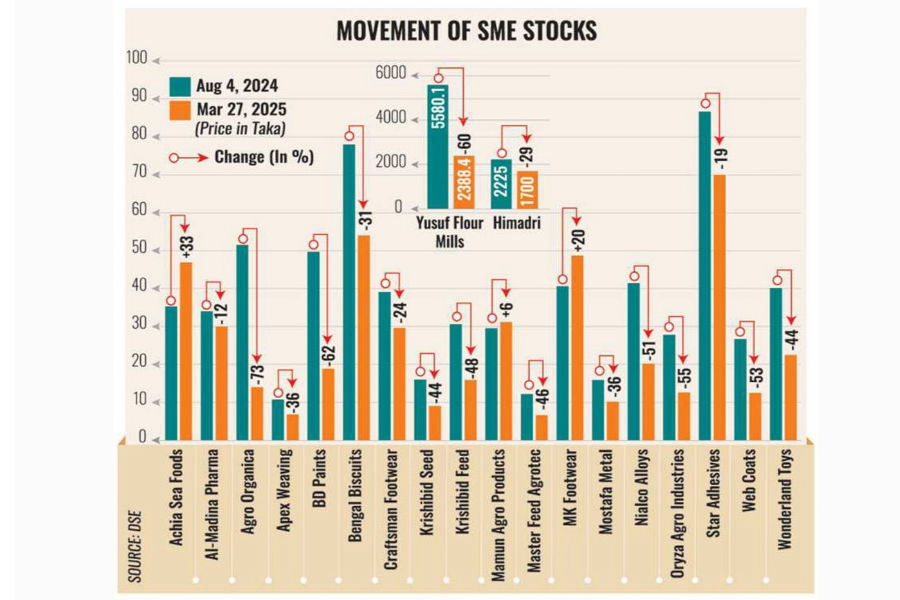
Published :
Updated :

The price index of small and medium enterprises (SMEs) on the Dhaka bourse has taken a massive plunge in the eight months since the collapse of the Hasina regime.
The corrections of SME stocks were due as their earlier price surges were artificial; price hikes did not go with the companies' financial performance.
Due to the price correction of 17 out of 20 stocks, the SME index fell by a whopping 484 points, or 33 per cent to go below the base point to 990 on March 27, the last trading day before Eid vacation.
Trading on the DSE SME board started on September 30, 2021 with six companies. The free-float base index was 1000 points, which peaked at 2244 points in August 2022.
SME stocks saw price erosion of 12-73 per cent while the market value shed Tk 11.4 billion to Tk 20.85 billion in the eight months under review.
In contrast, the market capitalisation of the Dhaka Stock Exchange's main board rose by Tk 248 billion as large-cap stocks surged, while the benchmark index slid only 10 points after the fall of the Hasina-led government in August last year.
Market experts said Yusuf Flour and Himadri, which used to keep the SME market soaring, finally underwent massive corrections, which led to a decline in SME index and market cap.
Other SME stocks had also appreciated without any positive earnings disclosure, raising questions. Analysts at the time pointed their fingers at speculations and rumours.
Following the change in the political landscape, investors started selling off their shares as speculations ran rife that the newly-formed Bangladesh Securities and Exchange Commission (BSEC) might take tougher actions to rein in price manipulation, said Akramul Alam, head of research at Royal Capital.
Subsequently, the little-known Yusuf Flour Mills plunged 60 per cent or by Tk 3,355 in the eight months on the DSE's SME board. The stock shot up to Tk 6,352 in early July last year.
Even after the major decline, the stock, which closed on the Dhaka bourse at Tk 2,225 per share on March 27, is overvalued, considering its price-to-earnings (P/E) ratio of 157.
The share price of Yusuf Flour Mills should not be that high, "higher than any other blue chip" in the main market, said Mr Alam.
Another SME firm Himari, which runs six potato cold storages in the northern part of Bangladesh, saw its stock plunge 29 per cent to Tk 1,700 per share in the period through March 27.
Himadri's stock had surged to Tk 10,000 each share in November 2023, leaving market experts in awe, as stocks of good companies with handsome profits and dividends given to shareholders were nowhere near that.
The market regulator in July last year finally penalised one individual investor, and three firms with fines of Tk 17 million in total for manipulating Himadri's stock.
The BSEC slammed the fines upon the completion of hearings based on investigation reports submitted by the prime bourse.
During an investigation of the DSE, the four investors were found involved in manipulating the share trading of Himadri between April 27 and August 28 of 2023. The stock surged from Tk 35.3 per share to Tk 2,790 per share during the time.
On taking charge, Khondoker Rashed Maqsood, chairman of the stock market regulator, and its commission took a number of market supportive measures and tough actions against wrongdoers.
The new commission has been working for sustainable development of the capital market and to bring those involved in irregularities to justice to ensure transparency and accountability.
In a major drive to enforce compliance, the new commission slapped big fines on several market manipulators and errant companies for involvement in malpractices during the tenure of the previous commission. That sent out a warning to market manipulators.
To address irregularities in the market, the securities commission heightened its surveillance too, said a BSEC official.
babulfexpress@gmail.com


 For all latest news, follow The Financial Express Google News channel.
For all latest news, follow The Financial Express Google News channel.